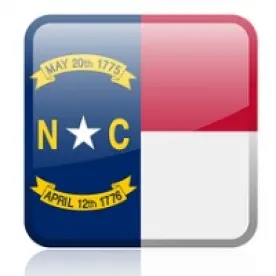The Business Court last week knocked down a fee request of Plaintiffs' class action counsel to $500,000, from the $660,000 requested, in an Order in Nakatsukasa v. Furiex Pharmaceuticals, Inc., 2015 NCBC 68.
The Settlement Of The Class Action
The ruling was entered in conjunction with the approval of a settlement of four class actions (two filed in North Carolina and two filed in Delaware). The lawsuits concerned a challenge to Defendant Furiex's merger with Defendants Royal Empress, Inc. and Royal's affiliate Forest Laboratories, Inc.
As a part of the settlement, Plaintiffs' counsel reserved the right to apply to the Court for approval of fees not to exceed $695,000. Given that the Defendants had waived their right to challenge the fee application, it fell to Judge McGuire to determine whether the fees requested were reasonable.
If the first question in your mind is "how much money did the Plaintiff obtain for the class?", the answer is none. The claimed value to the class came in the waiver of "DADW provisions" in Confidentiality Agreements executed by the Defendants Royal Empress and Forest Laboratories as well as other potential buyers of Furiex. There were also some additional disclosures obtained via the settlement.
DADW Provisions?
The NC Business Court hasn't had the opportunity to consider the viability of DADW -- don't ask, don't waive -- provisions, but the Delaware Court of Chancery has ruled that they are not presumptively impermissible. If you are wondering what a DADW provision does, it prohibits the entity signing it from making an offer for the target corporation's shares without an express invitation from the target's Board of Directors. The "don't ask" aspect prevents the signing party from asking the target's Board to waive that restriction.
Since the Court didn't discuss the validity of the DADW provision at all, except to say that the waiver of it procured by the litigation was "a significant benefit to shareholders," (Order ¶41), the validity of this type of deal protection device in North Carolina remains untested. Given that the Court accepted Plaintiffs' counsel's argument that they had obtained value for the class in the waiver of the DADW restriction (meriting fees of half a million dollars), lawyers in North Carolina should be cautious about including DADW's in their merger related documents .
The lawyers for the class (two New York class action firms) had a pretty high opinion of the value that they had obtained for the class. The requested that the Court allow $660,000 in fees for 700 hours of work.
You don't need to do the math to figure the hourly rate that those figures yield. Judge McGuire calculated it at a staggering $941.72 per hour (Order ¶35), which was triple the hourly fee the Business Court had approved in a previous class action (In re Harris Teeter Merger Litig., 2014 NCBC 44) and seven times the hourly fee awarded in another class action approval (In re Progress Energy Shareholder Litig., 2011 NCBC 44).
The Business Court Refused To Apply A Multiplier To Plaintiffs' Counsel's Lodestar
The $660,000 sought was based on a request for a multiplier of 1.7 to be applied to the lodestar amount established by Plaintiffs' counsel's regular billing rates (that was $388,465). A "lodestar," if you are not familiar with the term, Wikipedia defines it as "a method of computing attorney's fees whereby a trial court must multiply the number of hours reasonably spent by trial counsel by a reasonable hourly rate."
Judge McGuire observed that no reported North Carolina appellate decision had ever applied a multiplier to increase a lodestar amount (Order ¶35), so he decided that the "best course is to assess the requested fees as if Plaintiffs were seeking an award of $941.72 per hour, and to consider such request based on whether special legal skills and experience were involved that are not available in North Carolina, the rates charged by attorneys for comparable work in the local area, and in light of the result obtained for the amount of work expended." Order ¶35.
Were North Carolina attorneys capable of handling this litigation? The Plaintiffs' local counsel represented to the Court that "he did not believe there were a substantial number of attorneys in North Carolina prosecuting this type of shareholder action." Order ¶36. Judge McGuire said that the lack of specific information whether there were North Carolina attorneys qualified to handle the case warranted in favor of a "premium rate." Id.
The Court Said That A Fee Award Of $941.72 Per Hour Would Be "Extraordinary"
Looking at the electronic docket sheet in the case, Plaintiffs' counsel did little more than filing a Complaint, a Motion for Expedited Discovery, and a Motion for approval of the settlement that they brokered. On top of that, they took two depositions and reviewed only a thousand pages of documents. Order ¶39. Maybe the case did require supremely qualified counsel not available in NC.
The rates "generally charged for sophisticated business litigation in North Carolina" were deemed to be $321.91 per hour (found to be "reasonable in In re Harris Teeter, 2014 NCBC 44 at ¶63), although Judge McGuire said that "his own experience is that rates of approximately $300 - $550 per hour are typical of the fees charged for this type of work in Wake County, North Carolina. Order ¶37.
Looking at the substantially higher hourly fee of $941.72 sought by Plaintiffs' counsel, Judge McGuire deemed it to be an "extraordinary amount" (Order ¶41).
The Judge exercised his discretion and awarded $500,000 in fees. Order ¶42. That yielded an hourly rate of $712.96, still a pretty impressive award. And notwithstanding Judge McGuire's rejection of the application of a multiplier, I calculate that as a multiplier of 1.28711724 on the lodestar of $388,465.




 />i
/>i

